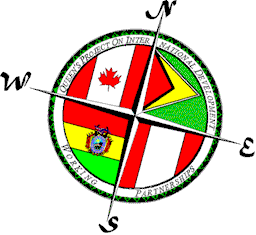QPID: Queen's Project on International Development
In the South American countries of Bolivia, Guyana, and Peru,
and in some parts of our own country there is a need for potable water, access to medical
services, and enhanced education. The irony of the situation is that there is an abundance
of young enthusiastic university students who are eager to cooperate in trying to find
solutions to these problems.
Queen's Project on International Development (QPID) strives to meet
these needs by providing aid to developing communities and providing professional
international experience for young Canadians. QPID operates on the following principles:
- Non-Profit and Student Operated
All of QPID's members are student volunteers from diverse academic, cultural and
economic backgrounds.
- Grass Roots Development Projects
QPID works directly with developing communities on small-scale engineering,
environmental, social and educational projects.
- Sustainable Development
Projects are designed to provide long term benefits that can be maintained by the
host communities. By providing students with practical overseas experience, QPID trains
individuals who will be able to contribute to international development throughout their
careers.
Since its establishment in 1990, QPID's primary objective has been to work in
conjunction with both Canadian and international organizations on development projects.
Recently, QPID has expanded to develop a First Nations project in which QPID members work
in conjunction with Native communities here in Canada. By providing human, financial, and
technical resources, QPID cooperants play a significant role in achieving the goals of the
communities in which they work. In addition to making valuable contributions, cooperants
benefit immeasurably from their experiences. QPID provides professional, cultural and
personal experiences that last a lifetime.
QPID focuses its development efforts in three main areas:
- Small Scale Engineering Projects
QPID helps to meet the short and long term needs of developing communities by
providing basic, appropriate technology infrastructure. Although work is performed in
other areas, most of QPID's engineering projects are aimed at providing potable water.
- Environmental and Social initiatives
QPID aims to inform the Queen's and Kingston communities about development and
related political and social issues including those which pertain to Native Canadians.
Motivated by the importance of the environment QPID has worked with several communities to
assess and mitigate environmental problems and concerns.
- Education Programs
QPID helps to ensure the sustainability of development by teaching children,
continuing teacher workshops and providing learning resources.
QPID's projects are performed in cooperation with local organizations who have identified
needs within their communities. The implementation of QPID's projects does not
itself constitute the goal, but only the means or instrument through which communal
development is motivated. This motivation manifests itself in the constant and permanent
participation of the community in its own development.
QPID does not pretend to solve all the world's problems. It does, however, strive to
make a contribution toward the betterment of the communities in which it works. Through
this effort we all benefit, both South Americans and Canadians.
Information about this year's QPID activities is available on the EngSoc Web. This
information is not on the Legend of the Greasepole CD, but if you have an
active Internet connection, click here to find out
more about QPID.
Science Quest
"I do, I understand."
That motto has formed the basis of our program's philosophy for the past 10 years. In
1988, two engineering students saw a need to stimulate interest in science, engineering
and math among young people. They started an innovative summer day camp that used
"hands-on" experimentation to foster this interest. Now, in our tenth year, our
programs have expanded tremendously but the grass-roots philosophy which has made Science
Quest successful remains the same. As well, Science Quest provides positive female and
male role models for the young people we encounter. Since our inception in 1988, other
universities across Canada have developed their own programs and it has developed into a
national organization, Youth and Engineering Science Camps Canada/Camps canadiens
pour les Jeunes en Science et Genie (YES Camps JSG). This organization, now with
26 members across the country, will reach approximately 190,000 children next summer.
Science Quest itself reaches close to 10,000 children a year.
Information about this year's Science Quest activities is available on the EngSoc
Web. This information is not on the Legend of the Greasepole CD,
but if you have an active Internet connection, click
here to learn more about Science Quest.
Women in Science and Engineering (WISE)
Women in Science and Engineering Corporation (WISE) is a national
association with headquarters in Toronto. Founded in 1977, WISE has chapters in Toronto,
Ottawa, Sarnia, Nova Scotia, and Newfoundland with approximately 300 science and
engineering members. The objectives of WISE are to:
- Encourage young women to seek higher education and achievement
- Assist women entering the science and engineering professions
- Act as an information centre for Canadian women
- Further awareness of professions in science and engineering
To meet these objectives WISE chapters have established career guidance
programs at high schools and universities. Our members act as role models and
speak to students about science and engineering career opportunities, as well as our
individual fields of specialization. In addition, some of our chapters have developed a
mentor program with the school boards which allow a student to spend one working day with
a professional in the student's area of interest.
Other activities include the publication of a newsletter, liaison with
other engineering, scientific and women's organizations, acting as an adovacte for women's
interests on technical and non-technical issues, and monthly meetings with members. These
meetings feature guest speakers on topics ranging from highly technical to general
interest.
WISE is an energetic professional organization whose members are dedicated to achieving
its objectives and increasing the awareness of professions in science and engineering.
Canadian Aeronautics and Space Institue (CASI), Queen's Chapter
Queen's CASI is a student-run chapter of this world-renowned Canadian
organization. Our goal is to introduce students to concepts in Aeronautics and Space
Science and to help foster an atmosphere for further pursuit, either personal or academic.
Areas of interest include aerodynamics, methods of propulsion, space flight and space
exploration, control and communications, materials science, and medicine as it pertains to
aerospace research. Presentations by speakers from Queen's as well as from industry and
research will be offered throughout the year on a variety of topics.
Opportunities for practical and hands-on experience in aerospace design are offered
through two model aircraft competition teams, one radio controlled and
one free-flight. More information about any of these can be obtained from Quenn's CASI.
Journals and other literature are available for members' use.
Queen's CASI also provides the chance for students to establish connections with
management, engineers and researchers in key companies in the Aerospace Industry in a
relaxing environment. If you have questions about a future in Aerospace or you simply have
an interest, CASI is the place for you.
QESEC
Queen's Engineering and Science Environmental Coalition (QESEC) is a
project-oriented environment group open to all engineering and science students interested
in getting involved. QESEC has local projects planned for Queen's and the Kingston
community, and is developing both national and international projects. QESEC doesn't just
talk about the environment, they do something about it!
Goals: To apply the knowledge and skills of engineering and science
students to projects; to develop new skills and gain valuable practical experience; to
educate ourselves on current environmental issues.
Project Objectives: To research and conduct a project
in Kingston during the school year with the potential to expand during the summer; to
research and develop a project to be conducted during the summer at a Canadian locale.
General meetings, with guest speakers on environmental topics, are held monthly and
project meetings are held weekly as needed. The QESEC office is 050B in the JDUC.
Come out and get involved!
|